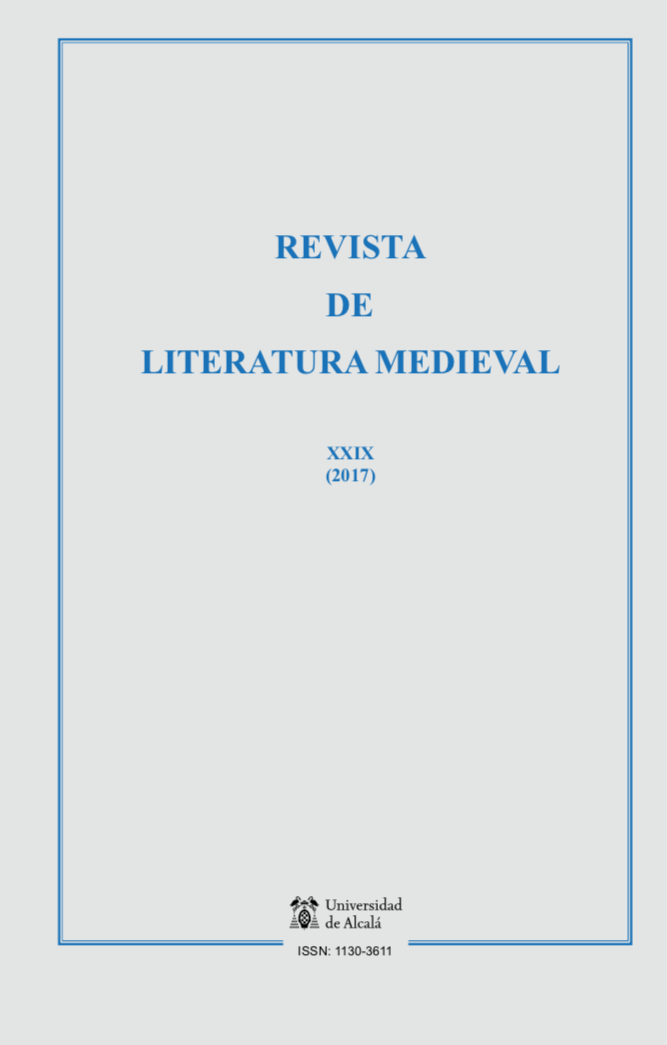«A morte en feminino na lírica galego-portuguesa: o Pranto por Beatriz de Suabia»
DOI:
https://doi.org/10.37536/RLM.2017.29.0.69394Resumen
Resume: A morte «real» da dama no corpus da lírica trobadoresca non é un tema habitual. Pero da Ponte, un autor innovador e renovador da tradición poética, compón o «único» pranto feminino conservado na lírica galego-portuguesa, Nosso Senhor Deus! Que prol vus ten ora. No artigo estudarase este lamento que deplora a morte de Beatriz de Suabia. Atenderase á contextualización da cantiga na tipoloxía elexíaca, ao personaxe da raíña, e á análise do texto. A arquitectura deste pranto segue o paradigma do planh occitano e, ademais, revela que a sombra de Alfonso X está presente na súa articulación.
Palabras clave: Mulleres, Edad Media, pranto, morte, lírica galego-portuguesa.
Abstract: The «real» death of the lady is not a common topic in the troubadoresque lyric poetry. Pero da Ponte, an innovative and reformist author of the lyric tradition, writes the «only» female lament conserved in Galician-Portuguese school, Nosso Senhor Deus! Que prol vus ten ora. This paper will study this compostition, which deplores the death of Beatrice of Swabia. It will analyse the contextualization in the elegiac tipology, the character of the queen, and the analysis of the text. The structure of the lament the model of the Occitan planh and reveals that the shadow of Alfonso X is present in the text.
Keywords: Women, Middle Ages, Lament, Death, Galician-Portuguese lyric poetry.
Descargas
Métricas alternativas
Descargas
Publicado
Cómo citar
Número
Sección
Licencia
Las opiniones y hechos consignados en cada artículo son de exclusiva responsabilidad de sus autores. La Universidad de Alcalá no se hace responsable, en ningún caso, de la credibilidad y autenticidad de los trabajos.
Los autores conservan los derechos sobre sus trabajos, aunque ceden de forma no exclusiva los derechos de explotación (reproducción, edición, distribución, comunicación pública y exhibición) a la revista. Los autores son, por lo tanto, libres de hacer acuerdos contractuales adicionales independientes para la distribución no exclusiva de la versión de la obra publicada en la revista (por ejemplo, alojarlo en un repositorio institucional o publicarlo en un libro), siempre que medie un reconocimiento de su publicación inicial en esta revista.
Los trabajos se publican bajo los términos estipulados en la Licencia de Atribución-NoComercial-CompartirIgual 4.0 Internacional Creative Commons (CC BY-NC-SA 4.0) que permite a terceros compartir la obra bajo las siguientes condiciones:
Atribución — Usted debe dar crédito de manera adecuada, brindar un enlace a la licencia, e indicar si se han realizado cambios. Puede hacerlo en cualquier forma razonable, pero no de forma tal que sugiera que usted o su uso tienen el apoyo de la licenciante.
NoComercial — Usted no puede hacer uso del material con propósitos comerciales.
CompartirIgual — Si remezcla, transforma o crea a partir del material, debe distribuir su contribución bajo la misma licencia del original.









